Pepperdine Partners with Ugandan Judiciary to Host African Chief Justices’ Summit on Alternative Dispute Resolution
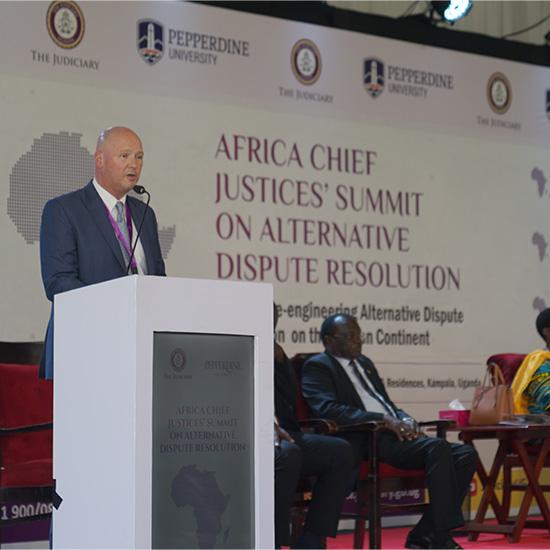
From Tuesday, March 5 to Wednesday, March 6, 2024, in Kampala, Uganda, Pepperdine University and the Ugandan Judiciary hosted nearly 300 officials, including 12 supreme court chief justices from across the African continent and justices and judges of African judiciaries, for the African Chief Justices' Summit on Alternative Dispute Resolution (ADR). The event, "Re-engineering the Administration of Justice on the African Continent," drew participants from around the world to discuss ways to advocate for the use of ADR mechanisms—the different ways disputes can be resolved without a trial, such as plea bargaining, mediation, arbitration, and neutral evaluation—in the delivery of justice.
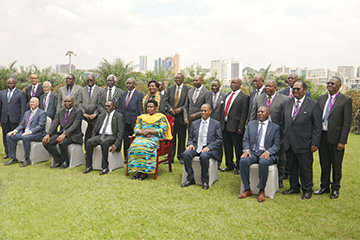
The summit provided chief justices and senior national justices a distinctive forum to collaborate with key stakeholders and was a pivotal opportunity for analysis, discussion, and the collective shaping of the future of ADR within the continent’s legal framework. Beyond the legal domain, the summit united representatives from justice systems, public institutions, and the private sector with the primary objective to explore diverse ADR forms and evaluate their efficacy in the evolving landscape of criminal and civil disputes in Africa.
During his opening remarks, Danny DeWalt, vice president and chief of staff of Pepperdine, discussed the almost 20-year partnership between the University and the Ugandan Judiciary and his hopes to continue to bring case studies from their learnings in Uganda on ADR mechanisms to the rest of the African continent. Pepperdine’s Sudreau Global Justice Institute has also partnered and established ADR pilot programs in plea-bargaining and public defender offices in countries such as Rwanda, Ghana, and Nigeria.
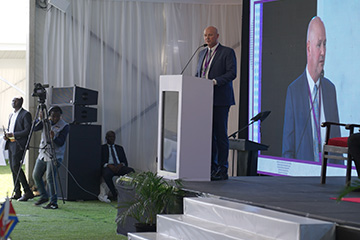
“Your presence represents the fulfillment of our vision for this event, which is to bring the continent together for unity and for collaboration on amodernmechanism of justice that parallels a millennium long traditional system of justice.” DeWalt said, “Case backlogs and overcrowding of prisons is a global crisis, but there are solutions and we have case studies now to show that Uganda has led the way in implementing these solutions and seeing incredible results. The strongest principles of justice and the longest-standing tools for bringing together a society are the tools of forgiveness, responsibility, and reconciliation, and that's what the heart of alternative dispute resolution is.”
Sukhsimranjit Singh, director of Pepperdine’s Straus Institute for Dispute Resolution, explored the role culture plays when administering ADR mechanisms and the significance of navigating culture as cross-cultural global mediators.
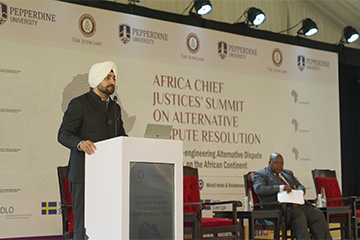 “Culture controls the way we think and our decision-making,” said Singh. “If you have
the power to negotiate with someone’s mind and thoughts, you have the power to change
their thinking and take control of the negotiation. As cross-cultural global mediators,
it is important to adapt, adopt, and be flexible to the culture and the nation you
are in. Part of culture is what you have and what others have, and it is the dance
between your culture and theirs that makes you a better human being.”
“Culture controls the way we think and our decision-making,” said Singh. “If you have
the power to negotiate with someone’s mind and thoughts, you have the power to change
their thinking and take control of the negotiation. As cross-cultural global mediators,
it is important to adapt, adopt, and be flexible to the culture and the nation you
are in. Part of culture is what you have and what others have, and it is the dance
between your culture and theirs that makes you a better human being.”
According to Singh, a nation that is willing to have an awareness of culture and an openness to implementing change will be the leader in the future. “It is all about accepting the past but moving towards the future,” he said.
Cameron McCollum (JD '17), director of the Sudreau Global Justice institute at Pepperdine,
presented on the background of the institute, sharing its key priority to support
all nations seeking better justice for their people while building new and strategic
relationships with nations around the world and collaborating with them to develop
and implement ADR mechanisms. McCollum reiterated the goal to rectify the global crisis
of case backlogs and discussed how ADR mechanisms such as plea bargaining can greatly
benefit countries economically and improve crime rates with increased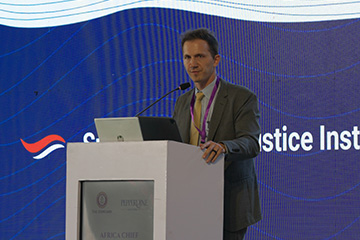 convictions, as well as provide individuals with timely access to justice.
convictions, as well as provide individuals with timely access to justice.
“The Sudreau institute exists to end the global crisis of case backlog, and that is because we know that an effective and efficient criminal justice system is thefoundation of any thriving community,” McCollum said. “It is my resounding belief that with implementation of ADR mechanisms and practices, the epidemic of case backlogs will end in our lifetime.”